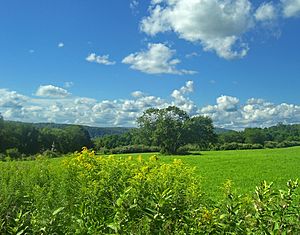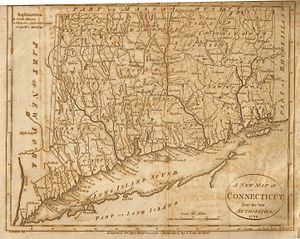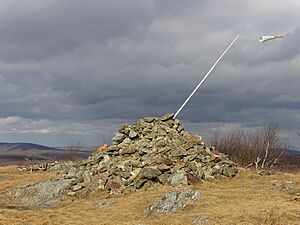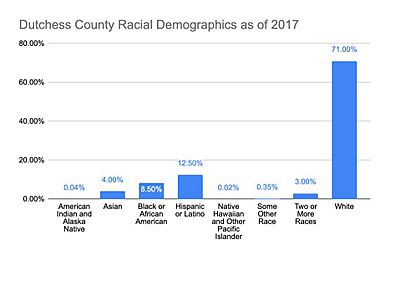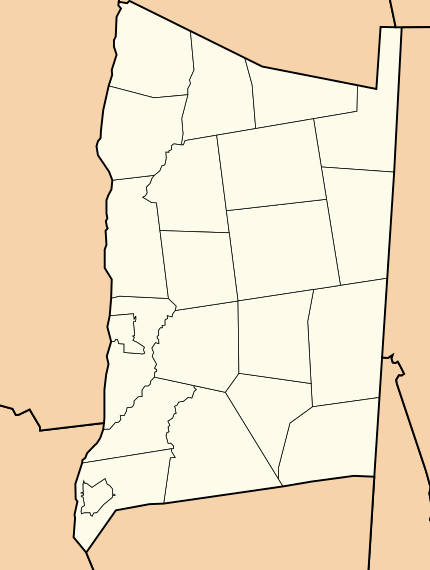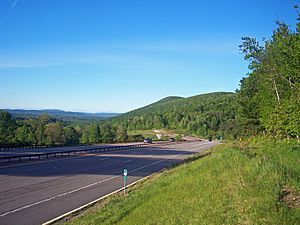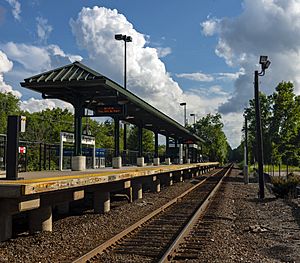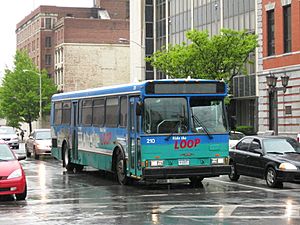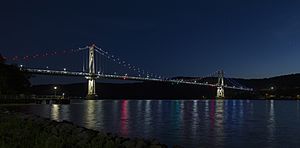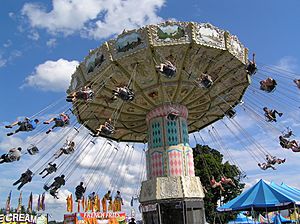Dutchess County, New York facts for kids
Quick facts for kids
Dutchess County
|
|||
|---|---|---|---|
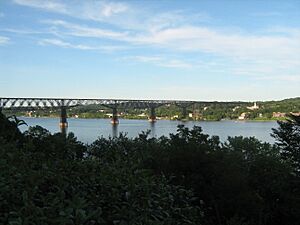
Walkway over the Hudson with the City of Poughkeepsie in the background and the Hudson River in the foreground.
|
|||
|
|||
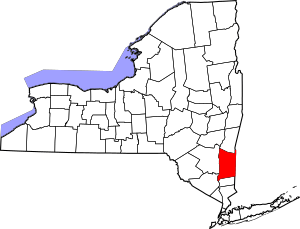
Location within the U.S. state of New York
|
|||
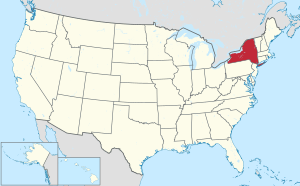 New York's location within the U.S. |
|||
| Country | |||
| State | |||
| Founded | November 1, 1683 | ||
| Named for | Mary of Modena, Duchess of York | ||
| Seat | Poughkeepsie | ||
| Largest city | Poughkeepsie | ||
| Area | |||
| • Total | 825 sq mi (2,140 km2) | ||
| • Land | 796 sq mi (2,060 km2) | ||
| • Water | 30 sq mi (80 km2) | ||
| Population
(2020)
|
|||
| • Total | 295,911 | ||
| • Estimate
(2021)
|
297,112 | ||
| • Density | 358.68/sq mi (138.49/km2) | ||
| Time zone | UTC−5 (Eastern) | ||
| • Summer (DST) | UTC−4 (EDT) | ||
| Area code | 845, 518, 838 | ||
| Congressional districts | 17th, 18th | ||
Dutchess County is a county in the U.S. state of New York. In 2020, about 295,911 people lived there. The main city and county seat is Poughkeepsie.
The county was created in 1683. It was one of New York's first twelve counties. It became fully organized in 1713. Dutchess County is part of the Hudson Valley region. It is also part of the larger New York metropolitan area.
Contents
History of Dutchess County
Long ago, before European settlers arrived, the Wappinger people lived here. They were a group of Native Americans. Their main meeting place was near what is now Fishkill Hook. They had many settlements throughout the area.
On November 1, 1683, New York created its first twelve counties. Dutchess County was one of them. It included what is now Putnam County. It also had a small part of Columbia County. The county was named after Mary of Modena. She was the Duchess of York. Dutchess is an old way to spell duchess.
New York and Connecticut agreed on their border in 1683. The border was set 20 miles (32 km) east of the Hudson River. Some land was given to Connecticut. In return, New York received a strip of land called "The Oblong". This strip runs north from Ridgefield to Massachusetts.
Until 1713, Ulster County managed Dutchess County. In 1713, Queen Anne allowed Dutchess County to elect its own leaders. These leaders included a supervisor and a tax collector. In 2013, Dutchess County celebrated 300 years of having its own local government. In 1812, Putnam County became a separate county from Dutchess.
Land Grants and Patents
Between 1685 and 1706, fourteen royal land grants were given out. These grants covered all of the original Dutchess County. This area included what is now Putnam County.
The first ten grants were given between 1685 and 1697. They covered most of the land along the Hudson River. Three of these, Rombouts, Great Nine Partners, and Philipse, stretched far inland. The last four grants, Cuyler, Fauconnier, Beekman, and Little Nine Partners, covered the remaining inland areas.
- 1685 Rombout (Beacon/Fishkill Area)
- 1686 Minnisinck (Sanders & Harmense)
- 1686 Kip
- 1688 Schuyler (Poughkeepsie)
- 1688 Schuyler (Red Hook)
- 1688 Ærtsen-Roosa-Elton
- 1696 Pawling-Staats
- 1697 Rhinebeck
- 1697 (Great) Nine Partners
- 1697 Philipse
- 1697 Cuyler
- 1705 Fauconnier
- 1705 Beekman (Back Lots)
- 1706 (Little) Nine Partners
Early Settlers
From 1683 to 1715, most settlers in Dutchess County were Dutch. Many came from Albany and Ulster counties. They settled near the Fishkill Creek and in areas like Poughkeepsie and Rhinebeck.
From 1715 to 1730, most new settlers were Germans. After 1730, many new settlers came from New England. For example, Elisha Cole from Cape Cod settled in Coles Mills in 1747.
20th Century Changes
Franklin D. Roosevelt lived in his family home in Hyde Park. His home is now a national historic site. It is managed by the National Park Service.
Before the 1960s, Dutchess County was mostly farmland. Since then, the southwestern part of the county has grown. It became a residential area with many people living in suburban communities. Many residents travel to jobs in New York City or Westchester County. The northern and eastern parts of the county are still rural. They have large farms and also homes used for summer or weekend getaways.
Geography and Nature
Dutchess County covers about 825 square miles (2,140 km²). About 796 square miles (2,060 km²) is land. The rest, about 30 square miles (78 km²), is water.
The county is in southeastern New York State. It is between the Hudson River to the west and the New York–Connecticut border to the east. It is about halfway between Albany and New York City. The county has two cities: Beacon and Poughkeepsie. New York City is about 58 to 110 miles (93 to 177 km) away by road.
The land in the county is mostly hilly. This is especially true in the Hudson Highlands in the southwest. It is also hilly in the Taconic Mountains to the northeast. Some areas closer to the river are flatter.
The highest point in the county is Brace Mountain. It is 2,311 feet (704 m) above sea level. The lowest point is sea level, along the Hudson River.
Wappinger Creek is the longest stream in the county. It is about 41.7 miles (67.1 km) long. It flows from Thompson Pond to the Hudson River. Its watershed (the area of land that drains into it) is the largest in the county. Fishkill Creek is the second longest stream. It is 33.5 miles (53.9 km) long. The county's largest and deepest lakes are Whaley and Sylvan.
Some streams in the southeast of Dutchess County are part of the Croton River watershed. This watershed helps supply water to New York City. In the east, streams flow into the Housatonic River in Connecticut.
Neighboring Counties
- Columbia County – north
- Berkshire County, Massachusetts – northeast
- Litchfield County, Connecticut – east
- Fairfield County, Connecticut – southeast
- Putnam County – south
- Orange County – southwest
- Ulster County – west
Protected Natural Areas
Dutchess County has many protected natural areas. These include:
- Appalachian Trail: A famous hiking trail that crosses the county.
- Eleanor Roosevelt National Historic Site: A historic home.
- Great Thicket National Wildlife Refuge: A wildlife area.
- Home of Franklin D. Roosevelt National Historic Site: Another historic home.
- Vanderbilt Mansion National Historic Site: A grand mansion.
Parks and Green Spaces
There are many parks for everyone to enjoy:
- Bowdoin County Park
- Fahnestock State Park (shared with Putnam County)
- Hudson Highlands State Park (shared with Putnam and Westchester counties)
- Stratt Town Park
- Wilcox County Park
- Tymor Forest
- Taconic State Park
- Beekman Rec
- East Fishkill Rec
- James Baird State Park
- Poughkeepsie Bridge (Walkway over the Hudson)
- Dover Stone Church
- Carnwath Farms Historic Site & Park
- Roosevelt Farm Lane
- Stony Kill Farm
- Mills–Norrie State Park
- Staatsburgh State Historic Site
- Tivoli Bays Unique Area
Some privately protected areas include:
- Mary Flagler Cary Arboretum
- Ferncliff Forest
- Innisfree Garden
- Pawling Nature Preserve
- Poets' Walk Park
- Thompson Pond and neighboring Stissing Mountain
Population and People
| Historical population | |||
|---|---|---|---|
| Census | Pop. | %± | |
| 1790 | 45,276 | — | |
| 1800 | 47,775 | 5.5% | |
| 1810 | 51,363 | 7.5% | |
| 1820 | 46,615 | −9.2% | |
| 1830 | 50,926 | 9.2% | |
| 1840 | 52,398 | 2.9% | |
| 1850 | 58,992 | 12.6% | |
| 1860 | 64,941 | 10.1% | |
| 1870 | 74,041 | 14.0% | |
| 1880 | 79,184 | 6.9% | |
| 1890 | 77,879 | −1.6% | |
| 1900 | 81,670 | 4.9% | |
| 1910 | 87,661 | 7.3% | |
| 1920 | 91,747 | 4.7% | |
| 1930 | 105,462 | 14.9% | |
| 1940 | 120,542 | 14.3% | |
| 1950 | 136,781 | 13.5% | |
| 1960 | 176,008 | 28.7% | |
| 1970 | 222,295 | 26.3% | |
| 1980 | 245,055 | 10.2% | |
| 1990 | 259,462 | 5.9% | |
| 2000 | 280,150 | 8.0% | |
| 2010 | 297,488 | 6.2% | |
| 2020 | 295,911 | −0.5% | |
| 2021 (est.) | 297,112 | −0.1% | |
| U.S. Decennial Census 1790–1960 1900–1990 1990–2000 2010–2020 |
|||
People in Dutchess County (2020 Census)
In 2020, the people living in Dutchess County were:
| Race | Num. | Perc. |
|---|---|---|
| White (NH) | 198,495 | 67.1% |
| Black or African American (NH) | 30,126 | 10.2% |
| Native American (NH) | 387 | 0.13% |
| Asian (NH) | 10,635 | 3.6% |
| Pacific Islander (NH) | 67 | 0.02% |
| Other/Mixed (NH) | 13,977 | 4.72% |
| Hispanic or Latino | 42,224 | 14.7% |
Cities, Towns, and Villages
| Dutchess County, New York |
|---|
|
|
Dutchess County has different types of communities. These include cities, towns, villages, and hamlets.
Cities
- Beacon
- Poughkeepsie (This is the county seat, where the main government offices are.)
Towns
- Amenia
- Beekman
- Clinton
- Dover
- East Fishkill
- Fishkill
- Hyde Park
- La Grange
- Milan
- North East
- Pawling
- Pine Plains
- Pleasant Valley
- Poughkeepsie
- Red Hook
- Rhinebeck
- Stanford
- Union Vale
- Wappinger
- Washington
Villages
Census-Designated Places (CDPs)
CDPs are areas that look like towns but are not officially incorporated.
- Amenia
- Arlington
- Bard College
- Barrytown
- Brinckerhoff
- Chelsea Cove
- Crown Heights
- Dover Plains
- Fairview
- Freedom Plains
- Haviland
- Hillside Lake
- Hopewell Junction
- Hyde Park
- MacDonnell Heights
- Marist College
- Merritt Park
- Myers Corner
- New Hackensack
- New Hamburg
- Pine Plains
- Pleasant Valley
- Red Oaks Mill
- Rhinecliff
- Salt Point
- Shorehaven
- Spackenkill
- Staatsburg
- Titusville
- Upper Red Hook
- Vassar College
- Wassaic
- Wingdale
Hamlets
Hamlets are small communities that are part of a larger town.
- Annandale-on-Hudson
- Arthursburg
- Attlebury
- Bangall
- Barnegat
- Castle Point
- De Witt Mills
- Fishkill Plains
- Glenham
- Gretna
- Holmes
- Hopewell Junction
- Hortontown
- Hughsonville
- Johnsontown
- Knapps Corner
- Lithgow
- Lomala
- Mabbettsville
- McIntyre
- Millbrook
- Norrie Heights
- Pecksville
- Pleasant Plains
- Poughquag
- Quaker Hill
- Rudco
- Shenandoah
- Shekomeko
- Staatsburg
- Stanfordville
- Stissing
- Stormville
- Swartwoutville
- Van Keurens
- Verbank
- Wiccopee
- Willow Brook
Education in Dutchess County
Dutchess County has many schools and colleges.
Public Schools
- Arlington Central School District
- Beacon City School District
- Dover Union Free School District
- Hyde Park Central School District
- Millbrook Central School District
- Pawling Central School District
- Pine Plains Central School District
- Poughkeepsie City School District
- Red Hook Central School District
- Rhinebeck Central School District
- Spackenkill Union Free School District
- Wappingers Central School District
- Webutuck Central School District
- Dutchess County BOCES
Private Schools
- Dutchess Day School
- Hawk Meadow Montessori School
- Holy Trinity School
- Millbrook School
- Oakwood Friends School
- Our Lady of Lourdes High School
- Poughkeepsie Day School
- Randolph School
- St. Denis-St. Columba School
- St. Martin de Porres School
- St. Mary School, Fishkill
- St. Mary's School, Wappingers Falls
- Trinity-Pawling School
- Tabernacle Christian Academy
- Upton Lake Christian School
Colleges and Universities
- Bard College (Annandale-on-Hudson)
- Culinary Institute of America main campus (Hyde Park)
- Dutchess Community College (Poughkeepsie)
- Marist College (Poughkeepsie)
- Vassar College (Poughkeepsie)
Transportation
Dutchess County has many ways to get around.
Roads and Highways
- Interstate 84 (I-84) goes through the county from east to west. It is the only interstate highway here.
- US 9, the Taconic State Parkway, and NY 22 are the main roads that go north and south.
- US 44, NY 52, NY 55, and NY 199 are the main roads that go east and west.
Bridges Across the Hudson River
Three bridges cross the Hudson River from Dutchess County:
- The Newburgh-Beacon Bridge carries I-84 and NY 52.
- The Mid-Hudson Bridge carries US 44 and NY 55.
- The Kingston-Rhinecliff Bridge carries NY 199.
Trains
The Metro-North railroad helps people travel to New York City.
- The Hudson Line runs along the Hudson River. It has stops in Beacon, New Hamburg, and Poughkeepsie.
- The Harlem Line runs on the eastern side of the county. It has stops in Pawling, Wingdale, Dover Plains, and Wassaic.
- Amtrak trains also stop in Poughkeepsie and Rhinecliff.
Buses and Ferries
Public buses in Dutchess County are called "the LOOP."
- The Newburgh–Beacon Ferry crosses the Hudson River. It is located at the Beacon train station.
Airports
- Hudson Valley Regional Airport is in Wappinger.
- Sky Park Airport is in Red Hook.
- For bigger flights, people use New York Stewart International Airport. It is across the Hudson River in Newburgh.
Culture and Fun
Dutchess County has many fun events and places.
- The Dutchess County Fair is held every year. It's a big event with rides, food, and animals.
- The County Chamber of Commerce holds a hot air balloon launch each July. Many colorful balloons fly over the Hudson River.
- The Dutchess County Historical Society works to save the county's history. They have a large collection at the 18th-century Clinton House.
Media
Dutchess County has local radio stations and newspapers.
- WKIP (AM) in Poughkeepsie is a news radio station.
- WRHV is an NPR radio station.
- The Poughkeepsie Journal is a newspaper published in Poughkeepsie.
- The Beacon Free Press and Southern Dutchess News are also published here.
Sports Teams
- The Hudson Valley Renegades are a minor league baseball team. They are connected to the New York Yankees. They play at Dutchess Stadium in Fishkill. They have been in Dutchess County since 1994.
Other past sports teams include the Hudson Valley Bears (hockey) and the Hudson Valley Hawks (basketball).
See also
 In Spanish: Condado de Dutchess para niños
In Spanish: Condado de Dutchess para niños




